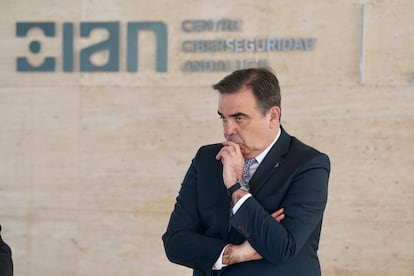In Brussels, it felt very bad that the Eurovision organizers on Saturday vetoed entry to the contest venue with the flag of the EU, which is in turn that of the Council of Europe. “What happened is unprecedented, the idea of security personnel taking European flags out of bags and throwing them in the trash in what is supposed to be the great European moment of diversity…”, he lamented this Monday the vice president of the European Commission, Margaritis Schinas, who has warned that he will demand explanations from the organizers of the contest, the European Broadcasting Union, and also from the public television stations that comprise it. The signs of anger were even greater at the headquarters of the European Executive, where its main spokesperson, Eric Mamer, spoke of “something completely regrettable”, in his first public intervention after the event, in which Switzerland won.
Schinas’s demand for explanations has a deadline: on May 23, the official debate between the candidates to preside over the European Commission is organized before the elections to be held in the EU between June 6 and 9. “It is advisable that (explanations) be given before the debate. If they do not occur sooner, this absence will be part of the debate,” the Greek politician has warned.
It has especially hurt in Brussels that the organization banned the flag of the European institutions – both those that are part of the EU structure and those of the Council of Europe – in Eurovision, an event that tens of millions of European citizens follow every year. . “How can European events be deprived of an event like this?” Schinas asked, adding that the flag “symbolizes a certain idea of Europe” and that he is not willing to let go of the treatment that has been given to this symbol, born in 1955 as a sign of unity just a decade after the Second World War.
The argument that the Eurovision organizers have given so far is that only flags from the countries participating in the contest and two types of flags from the LGBT community were allowed to enter. With this measure, consequently, the entry of the Palestinian flag was prevented, as a sign of protest against the dramatic situation in Gaza after months of invasion by the Israeli army and with the threat of entry into Rafah. However, this decision has had the indirect effect of leaving out the well-known blue flag with a circle formed by 12 yellow stars.
From Brussels it is also suspected that there was an intention not to upset Georgian public television, one of the participants. Many protests have taken place in the Caucasian country in recent weeks against a law on foreign interference, and the symbol most used by protesters to symbolize their protest was the EU flag. However, Vice President Schinas did not want to publicly speculate on the reasons that led to the decision: “I don’t want to think in a conspiratorial way. “I want to have the information first.”
In any case, in Brussels the explanation of the tense geopolitical situation – whether in the Middle East or the Caucasus – is not convincing. Spokesman Mamer has come to say that the Eurovision organizers are dedicated to setting up a musical contest and it is not their responsibility to “make an analysis of the geopolitical situation.” Adding, furthermore, that the flag of the Union, made up of 27 European States, “and of the Council of Europe”, an idea on which he has influenced on several occasions – adding that this institution is made up of 46 states, including those of the EU—represents its members and, therefore, it made no sense to leave it out.
Flag war in Malmö: This is not a page torn from the school dictionary. It is the cheat sheet of the Eurovision guards to know which flags to seize from the attendees and which ones not to. They don’t even leave the EU and look for the Palestinian 🇵🇸 as if it were 💣.
📸@hlmartinez2010 pic.twitter.com/xRucsCyKYF— Luis de Vega (@Ldevega) May 11, 2024

